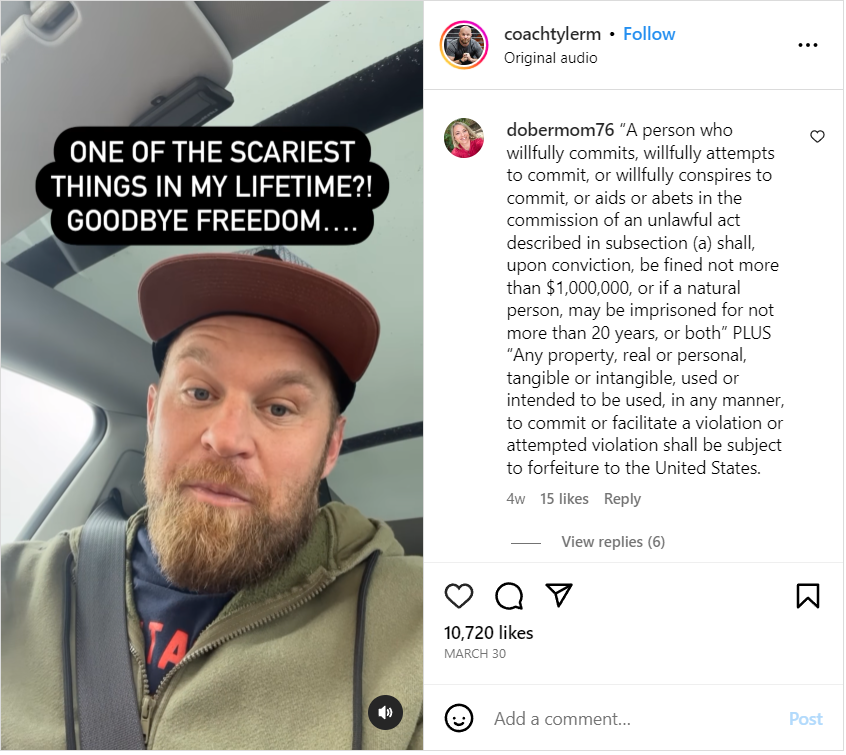STORY UPDATED: check for updates below.

Under the RESTRICT Act, would a person be fined up to $1 million and imprisoned for a minimum of 20 years for accessing content on TikTok if it's banned in the United States in the future? Yes, that's partially true: However, none of the legal experts contacted by Lead Stories believe prosecutors would pursue such charges against someone using a VPN (virtual private network) to access the app. Furthermore, the 20-year imprisonment is the maximum penalty under the legislation, not the minimum.
The claims appear in a post and video on Instagram on March 30, 2023. The video includes this banner:
ONE OF THE SCARIEST THINGS IN MY LIFETIME?!
GOODBYE FREEDOM....
This is what the post looked like on Instagram at the time of writing:
(Source: Instagram screenshot taken on Mon May 1 18:10:44 2023 UTC)
The 90-second video begins with the narrator laying out his case. He says:
So, you want to hear one of the scariest things to happen in my lifetime? It's happening right now, right in front of our eyes and no one's talking about it. Well, I guess they're talking about it, they're saying it's the TikTok ban. ...
If you have a VPN or a virtual proxy server and you're using it to access banned content, which is just crazy in general, they can fine you up to $1 million and a minimum prison sentence of 20 years in prison.
The narrator is referring to legislation in Washington known as the RESTRICT Act (S.686), which stands for Restricting the Emergence of Security Threats that Risk Information and Communications Technology Act. It was first introduced in the U.S. Senate on March 7, 2023. Although the bill doesn't name TikTok, its main sponsors -- Sens. Mark R. Warner, a Democrat from Virginia; and John Thune, a South Dakota Republican -- made sure to mention the app owned by Chinese internet technology company ByteDance in their press release announcing the legislation. Warner said:
Today, the threat that everyone is talking about is TikTok, and how it could enable surveillance by the Chinese Communist Party, or facilitate the spread of malign influence campaigns in the U.S. Before TikTok, however, it was Huawei and ZTE, which threatened our nation's telecommunications networks.
Thune added:
Our country needs a process in place to address these risks, which is why I'm pleased to work with Senator Warner to establish a holistic, methodical approach to address the threats posed by technology platforms - like TikTok - from foreign adversaries.
Warner's communications director, Rachel Cohen, said in a May 1, 2023, phone interview with Lead Stories that the intent of the bill isn't to penalize individuals who want to watch content on TikTok. She said it's not written in the law:
So, under the text of the bill, the threshold for the criminal penalties that are outlined in the bill are incredibly high, too high to ever be concerned with the actions of an individual user of, you know, say, TikTok or any other app. Under the terms of the bill, someone has to be engaged in, quote, 'sabotage or subversion' of American communications technology products or services, or creating 'catastrophic effects' on U.S. 'critical infrastructure,' or 'interfering in, or altering the results' of a federal election in order to be eligible for any type of criminal penalty. ...
The criminal penalties in the bill are aimed squarely at companies who conspire to evade the terms of the bill, not at individual users. Moreover, the bill text does not talk about VPNs anyway.
That much is true. The legislation makes no mention of VPNs as the video suggests it does. However, Georgetown University law and technology professor Anupam Chander told Lead Stories in a May 1, 2023, email that the video makes a valid point and would give officials in Washington broad powers:
I have to conclude that the claim is, much to my surprise, true. The bill is written so broadly that a person using a VPN to access a prohibited service emanating from China or Russia could technically be charged with a violation of the statute, and up to one million dollars or 20 years in prison. I can't imagine a prosecutor bringing such a claim, but I think that the bill should be significantly narrowed to avoid this possibility.
The bill gives the U.S. secretary of commerce the power, among other things, to prohibit "transactions" with tech products or services that foreign adversaries and the companies they control have an interest in, but only as needed to counter certain "undue or unacceptable risk" to national security. So, potentially, the secretary could make it unlawful for individuals to use TikTok.
Kyle Langvardt, a member of the Nebraska Technology & Governance Center at the Nebraska College of Law, said in a May 2, 2023, email to Lead Stories that, while going after a person is unlikely, the broad powers the bill would give to the commerce secretary, are concerning. He continued:
The bill also makes it a crime to violate one of the rules the Secretary sets out. So -- again in principle -- you can spin out a scenario where it becomes a crime for an individual under US jurisdiction to use a VPN to work around a TikTok ban. But only if the Secretary in consultation with various agency heads identified under the statute determines that such a measure is needed to head off an 'undue or unacceptable' risk to national security.
The idea that the Secretary would go around prosecuting individuals who use VPNs to get around a TikTok ban seems fanciful to me.
Langvardt added:
The guy in the Instagram video is wrong about the penalties. There is no minimum prison sentence of 20 years. Instead, it is a maximum prison sentence of 20 years and a maximum fine of $1,000,000.
The video's narrator says 20 years in prison would be the minimum, not the maximum.
Chinmayi Sharma at the Robert Strauss Center for International Security and Law at the University of Texas at Austin School of Law told Lead Stories in a May 2, 2023, email that she's not as concerned about the wording of the RESTRICT Act but acknowledges that it's indefinite. She said:
This bill is focused on prohibited transactions by entities not people. While the language is vague and can be interpreted to cover activities by persons, that is not obvious. The criminal activities prohibited are engaging in or abetting the prohibited conduct, which again, is primarily focused on transactions.
Updates:
-
2023-05-03T14:28:52Z 2023-05-03T14:28:52Z Fixes a typo in a quote from Langvardt


















